

2025 Regular Session Recap
Lawmakers provide $8.5 billion in education funding and address salaries, discipline, cellphone use and more
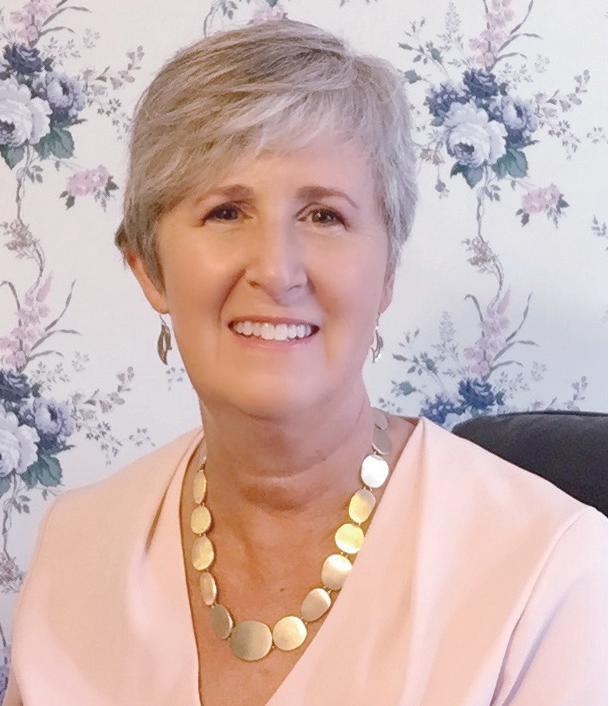

Heart of the community
As I write this column, just days after the July 4 flooding in Central Texas, the tragedy weighs heavy on my mind. The toll on communities and the entire state was staggering, and heartbreaking. But as media reports came in during that weekend and the following days, I was struck by the many connections with schools.
Educators were victims of the Texas floods. Julia Burgess, a third grade teacher from Liberty, and her husband and two sons, passed away; as did Jeff Wilson, a high school teacher in Humble, along with his wife and son. Reece Zunker was a teacher and coach in Kerrville, and his wife was a former teacher; they and their two young children were also killed in the flood.
So many children, most school-aged, and far too many to name here, were lost. The loss of young lives seems to hit that much harder, and the pain of their surviving families and friends is unimaginable. When classes begin in August, schools will have to find ways to help explain these losses and help teachers and classmates navigate the grief.
We often hear the phrase, “schools are the heart of a community.” Sometimes that’s just a talking point for a politician. But it’s also absolutely true in very tangible ways.
Texas schools are part of our daily life. Parents send their children to class year after year, trusting that they will be cared for, educated, and returned home safely. The people directly involved in our education system — teachers, aides, cafeteria workers, administrators, school board members and more — are also our family members and friends and neighbors. Schools are where we work, vote, attend PTA meetings, volunteer for food drives, attend extracurricular events, and, of course, educate our children. And during emergencies, they are among the first to open their doors, not just for students, but for everyone in need.
Schools and educators are ingrained in our communities. They are hit hard when tragedy strikes, yet are also, always, part of the solution. It seems that people instinctively turn to their local schools in times of disaster, and the education community is quick to respond. Maybe that’s because people with nurturing hearts are drawn to education, or because the idea of public service is inherent in this profession, reaching far beyond what happens in the classroom.
In times of crisis, campuses become much more than a place to learn reading and math. They become shelters, reunification centers, volunteer coordination locations and food distribution hubs.
When local officials needed help rescuing stranded campers, they called Kerrville ISD. School employees volunteered to drive district school buses in dangerous conditions, bringing hundreds of people to safety.
A group of students from Burnet ISD’s FFA chapter, with help from their ag teacher, have been repairing fences and clearing debris in Burnet County, an area also hit hard by flooding.
In response to July 4 flash floods near Austin that claimed around 20 lives, the Leander ISD Education Excellence Foundation partnered with Hill Country Community Ministries to fundraise. As in Kerrville, school district transportation services were deployed, taking affected residents to shower facilities and recovery areas. And school officials have been personally contacting families to check on their well-being.
A Houston parent-teacher organization shared the news of a family whose
Continued on page 23
Texas Classroom Teachers Association
PO Box 1489, Austin, TX 78767-1489
Office hours: 8 a.m. to 6 p.m., weekdays
Phone: 888-879-8282
Fax: 512-469-9527
Website: tcta.org
2025-26 Board of Directors
President
Vivian Burleson, Northside
President-Elect
Cristal Isaacks, Levelland
Immediate Past President
Melody Young, Sherman
Budget
Thomas Evans, Abilene
Curriculum & Instruction
Vacant
Governance
Sharron Wood, Deweyville
Legislation
Brec Espinoza, Brownwood
Membership
Velma Sanchez, Pharr-San Juan-Alamo
Professional Rights & Responsibilities
Erick Hurtado, Edcouch-Elsa
Teacher Personal Services
Melanie Hoyt, Pottsboro
Staff Contacts
Executive Director
Ann Fickel
Attorneys
Michael Currie
Julie Leahy
Paige Williams
Kaylan Dixon Smith
Derrell Coleman
Communications
M. Clare Haefner
Legislation
Paige Williams
Pamela McPeters
Quinn McCall
Kaylan Dixon Smith
Ann Fickel
Membership
Persie Tynes
Services Corporation
Jan Lanfear
Contract Attorney
Lindsay Gustafson
Senior Policy Consultant
Holly Eaton
About TCTA
The Texas Classroom Teachers Association is an independent association for Texas teaching professionals that was founded in 1927. TCTA is based in Austin and is the only statewide teachers association that limits active-level membership to those directly involved in classroom teaching or teaching support.
2025 Regular Session Recap
Lawmakers provide $8.5 billion in education funding and address salaries, discipline, cellphone use and more

17
On the Cover Regular Session Recap
Lawmakers pass several major education bills in 2025
Despite the passage of a school voucher plan, schools and teachers secured some wins during the 2025 regular session of the Texas Legislature, including increased salaries and school funding, and new supports in addressing student discipline. Lawmakers also banned students from using cellphones, smart watches and other communication devices during the school day.
Cover photo: iSTOCK | Kerkez
FEATURES
Consider this before teaching after retiring
If you’re a retired teacher who has thought about returning to the classroom, you’ll be happy to hear that there may be options available to you.
HB 6: Key changes to school discipline
TCTA worked closely with lawmakers to ensure that our priorities were reflected in HB 6, which makes major updates to student discipline rules.
In the Classroom
Meet three TCTA members honored as 2025 H-E-B Excellence in Education state finalists and learn more about what inspires and motivates them to stay in education.
Meet Vivian Burleson
TCTA’s 2025-26 state president looks forward to being an advocate for educators across Texas and reflects on how teaching has evolved during her two-plus decades of service.
© 2025. Publication schedule is quarterly. Annual membership dues for TCTA are $175, $5 of which is allocated to a one-year subscription to THE CLASSROOM TEACHER. Subscriptions for nonmembers are available for $10 per year. POSTMASTER: Please send changes of address, articles and/or photographs to: Editor, THE CLASSROOM TEACHER, PO Box 1489, Austin, Texas 78767-1489. TCTA is located at 700 Guadalupe, Austin, Texas 78701. PERIODICALS POSTAGE PAID AT AUSTIN, TEXAS.
TRS Board sets rates for active, retiree health insurance
Premiums for all 2026 TRS-Care plans will stay the same after the TRS Board of Trustees set rates during its July 17-18 meeting in Austin.
While all TRS-Care participants will continue current coverage without a change in monthly premiums, TRS-Care Standard deductibles will slightly increase on Jan. 1 to align with IRS guidelines that allow participants to use a health savings account with the plan.
TRS-Care will continue to offer dental and vision plans in 2026. Enrollment is open Oct. 1 through Dec. 8 for those wanting to start or change coverage. For those who enrolled in vision or dental plans in 2025, coverage automatically renews Jan. 1. Enrollment can be done over the phone or through the MyTRS Portal online.
TRS staff will hold several TRS-Care Health Education Fairs in person and online in August, September and October to help retirees make the most of their TRS-Care benefits. Learn more and register at trs.texas.gov/health-benefits/events
TRS also has a new member rewards program for TRS-Care Standard participants. Starting Sept. 1, participants can earn up to $599 annually when they see high-quality, low-cost providers. TRS will provide more information on this program soon on its TRS-Care resources webpage at trs.texas.gov/ health-benefits/retiree-health/care-resources
TEA releases A-F accountability ratings after legal challenges end
The Texas Education Agency made A-F accountability ratings from the 2022-23 school year available to the public in late April. The release of the ratings was delayed by a lawsuit after about 60 school districts objected to changes in how they were graded.
Of the nearly 1,200 districts evaluated in the state, 10.4% received an A, 73% received a B or a C, and 16.6% received a D or F. Fort Worth ISD could face a state takeover after several years of failing grades at a sixth grade campus, but the district said it has already closed the low-performing school and does not expect intervention.
A-F ratings for the 2023-24 school year, which also were delayed by a lawsuit, will be released in mid-August, TEA announced in July.
Go to TXschools.gov to see how your district and campus were rated.
The TRS Board met June 3 to set premium rates for TRSActiveCare plan participants during the 2025-26 school year after the Texas Legislature approved $369 million to help offset ActiveCare premiums for current educators.
Rates are increasing an average of 9.7% during the 2025-26 plan year. Exact pricing is based on the Education Service Center region in which a school district is located. To see rates in each region, go to trs.texas.gov/health-benefits/activemembers/coverage/rates
The TRS Board also approved changes to ActiveCare benefits:
• Referral liberalizations: Participants in TRS-ActiveCare Primary and TRS-ActiveCare Primary+ will no longer require a referral from their primary care provider (PCP) to visit certain specialists. They can see dermatologists, receive physical therapy and get routine eye exams without a referral.
• Member rewards: TRS-ActiveCare participants will be given one reward per year for seeing a PCP with a top-performing physician designation from BCBSTX. They’ll also receive a reward for seeing a specialist with the same designation, and two rewards if the visit is at a rewards-eligible facility.
• Expanding musculoskeletal benefits: TRS will begin offering Airrosti Remote Recovery programs with access to virtual, no-cost care that will help members manage joint and back pain, among other musculoskeletal issues.
SBOE starts review process on 3 sets of instructional materials
The State Board of Education has begun its second cycle of reviewing materials submitted through the instructional materials review and approval (IMRA) process. This year’s review includes:
• K–6 full-subject, tier-one English Language Arts and Reading (ELAR) and Spanish Language Arts and Reading (SLAR)
• K–3 partial-subject, tier-one English and Spanish phonics
• K–12 full-subject and supplemental tier-one Mathematics
SBOE will hold public hearings on the 2025 IMRA materials this fall before an expected vote in November to approve items for use in Texas schools.
To learn more about the IMRA process and the materials under review this year, go to https://sboe.texas.gov/stateboard-of-education/imra.
TEA: Spring 2025 STAAR scores show mixed results
TEA released results from Spring 2025 STAAR exams in grades 3-12 in June, with high schoolers showing improvements in STEM subjects while younger students made gains in reading and language arts.
End-of-course overview: High school students taking end-of-course exams showed improvement in math and science, with declines in English, according to TEA data.
In Algebra I, 47% of students met grade level, up slightly from 45% in spring 2024. Biology showed a notable improvement, with 62% of students meeting grade level compared to 57% last year. English I and English II saw slight declines, with 51% (down from 54%) and 56% (down from 60%) of students meeting grade level, respectively. U.S. History remained relatively stable, with 68% meeting grade level, down a percentage point from 2024.
Grades 3-8: Reading language arts scores improved across all levels in grades 3-8. The largest RLA improvements were seen in grade 5. In math, performance varied by grade level, but notable gains were observed in grades 3 and 8. Science scores also rose slightly, but Grade 8 social studies scores declined by one percentage point.
“These results are encouraging and
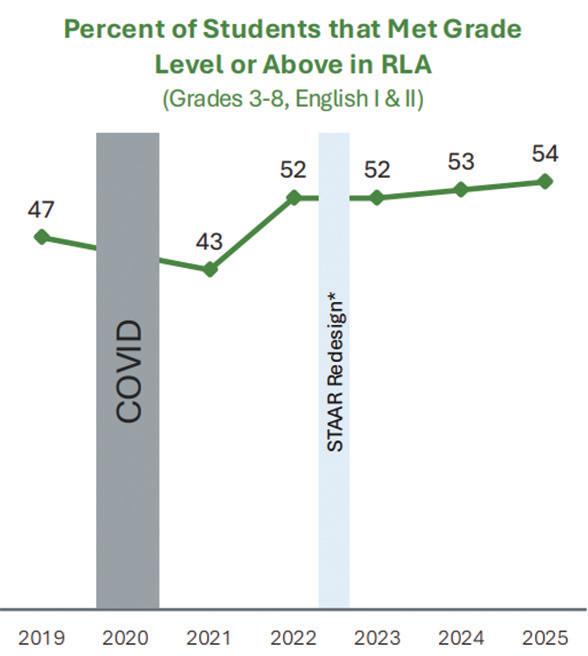
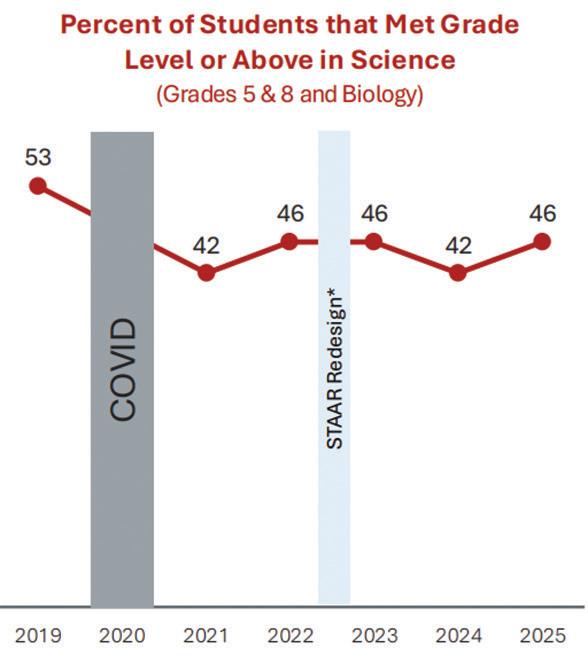
reflect the impact of the strategic supports we’ve implemented in recent years,” said Education Commissioner Mike Morath in a statement. “With RLA scores now surpassing pre-pandemic
Abbott reappoints TCTA member to SBEC
In late April, Gov. Greg Abbott has appointed Adam Booth and Tara Turk-Zaafran and reappointed TCTA member Wanda “Jean” Streepey to the State Board for Educator Certification, for terms set to expire on Feb. 1, 2031.
Abbott appointed Latisha Andrews to the board for a term set
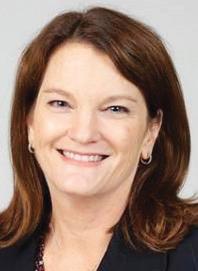
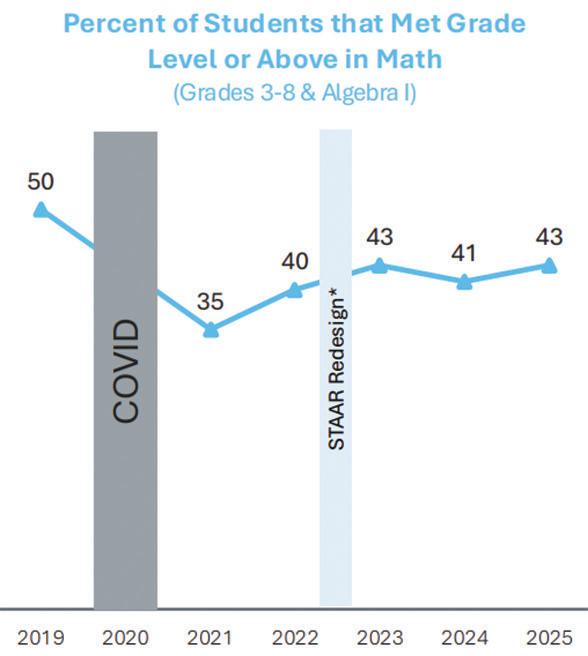
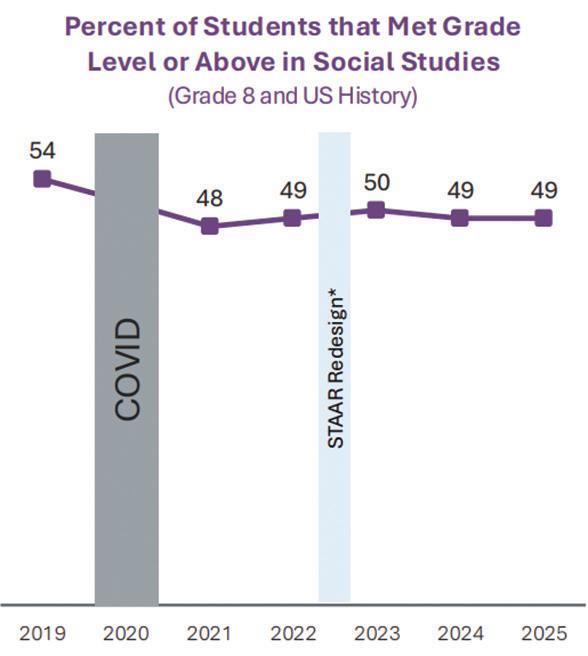
levels (in grades 3-8), we are seeing meaningful signs of academic recovery and progress. While this year also saw some improvements in math, clearly more work is needed.”
MEMBER
to expire on Feb. 1, 2029.
Streepey of Dallas is a high school business teacher for Highland Park ISD. She previously taught middle school math and STEM for 16 years and represented Texas as a Presidential Awardee for Excellence in Mathematics and Science Teaching. Streepey
Share your success with us! Were you chosen as your campus Teacher of the Year? Did you win an award or receive grant funding? Email communications@tcta.org and tell us about your recognition so we can share it in The Classroom Teacher
Create connections on campus
The beginning of the school year is a great time to make connections with other colleagues on campus.
Hosting an ice cream social, sharing snacks in the break room, leaving a bag of chips in a colleague’s mail box with a membership brochure or stopping by classrooms with cookies and a legal services flyer can help break the ice and provide an opportunity to talk about TCTA membership.
Campus faculty representatives are eligible for up to $20 to reimburse expenses for recruitment activities on campus, and local affiliate officers can use funds from local dues for membership mixers, too.
Making connections early in the year is about more than asking colleagues to join TCTA or reminding them to renew their membership. Building camaraderie on campus can help empower educators and give everyone a greater voice.
In many districts, TCTA members attend school board meetings or have a representative on campus and/or district committees where important issues are discussed. Holding local TCTA membership meetings or sending an email or newsletter to other TCTA members on your campus or in your district are a great way to share what’s happening and get input to take back to district officials.
If your local affiliate hasn’t had regular meetings in a while, TCTA Headquarters can help you get started. We can email all the TCTA members at your campus, district or regional level to invite them to a meeting or happy hour or to simply share news and ask for input.
As you’re making plans, remember that field-service requests provide an opportunity for a member of TCTA’s Board of Directors, Advisory Council or headquarters staff to attend a local meeting to present information, lead a discussion or share ideas. Learn more or fill out the form at tcta.org/fieldservice.
Whether formal or informal, local TCTA member mixers

Isaacks encourages colleagues in Levelland to join TCTA during a coke float party in the library. Check out more slogans and ideas for snacks on page 8 of our Faculty Representative Handbook at tcta.org/ FRhandbook.
and meetings provide an opportunity to share ideas, discuss problems and pose solutions.
The beginning of the school year is a great time to start creating connections. Let us know how we can help by contacting Persie Tynes, TCTA’s director of membership, at membership@tcta.org or 888-879-8282.
Show your TCTA spirit with branded merchandise!
TCTA offers three ways to get branded clothing and other merchandise.
The TCTA Threads collection at Bonfire includes premium shirt designs available in a variety of styles, colors and sizes, tote bags, a duffel bag and TCTA coffee mugs. Merchandise is printed when you order and shipped directly to you.
Members also can purchase apparel and other items through our Land’s End
storefront. Select your items, add our logo in your choice of colors, and your order will be embroidered and shipped to you by Land’s End.
Need large quantities or custom merchandise for your local affiliate?
Check out the list of available items for purchase or submit a request for a special order and/or custom artwork from TCTA Headquarters. We can help find items to fit every budget.
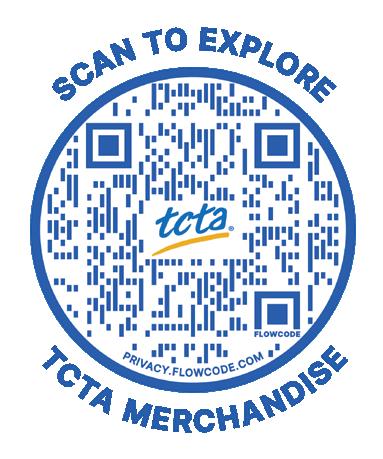
Explore the custom collections for yourself at tcta.org/merchandise
Cristal

Efforts to reduce Education Department’s size, scope continue
President Donald Trump’s March 20 executive order to “close” the U.S. Department of Education gives Education Secretary Linda McMahon the authority to facilitate “under the maximum extent appropriate and permitted by law,” the return of education policies to states.
It also instructs that the distribution of department funds should comply with the Trump administration’s policies — specifically, the termination of diversity, equity and inclusion awards and programs promoting gender ideology.
There are many K-12 and higher education programs that are authorized in statute to be placed at the U.S. Department of Education and legally cannot be reassigned to another agency without congressional approval. However, McMahon has already demonstrated a willingness to challenge congressional authority by transferring management of the adult education program to the Department of Labor and delaying appropriated funding to state education agencies for K-12 programs for undocumented students.
Furthermore, the Department of Government Efficiency (DOGE) led a reduction-in-force effort that has resulted in over 50% of the Education Department staff being cut. While a lawsuit was filed against this action and the outsourcing of the department’s operations to other agencies, the U.S. Supreme Court in July ruled in favor of the administration. Additional
cross-agency agreements to transfer management of certain programs are expected to follow, such as the Treasury Department taking over administration of the federal student loan portfolio.
FY26 Appropriations
The president’s Fiscal Year 2026 budget request for the Education Department recommends an overall funding reduction of 15% and proposes the block granting of various programs directly to state education agencies.
Regarding some K-12 programs of interest, the FY 2026 budget request:
• Maintains level funding for Title I, but eliminates $428 million from Title I, Part C-Migrant Education and Special Programs for Migrant Students.
• Streamlines IDEA/special education programs, which are effectively level funded at $677.6 million.
• Recommends a consolidation of 18 existing K-12 formula and competitive grant programs into two formula grant programs to states. However, the overall funding level for these programs is reduced by $4.5 billion, a significant loss of resources. States would make the determination of
which allowable activities would be supported with their share of funds.
• Eliminates funding for Education Innovation and Research, Teacher and School Leader Incentive Grants, Supporting Effective Educator Development (SEED), Full-Service Community Schools, Rural School, and 21st Century Community Learning Centers and the Teacher Quality Partnerships program.
• Increases funding for the charter school program by $60 million, for a total of $500 million.
After the president sends a budget request to Congress, both the House and Senate Appropriations Committees take input from members and write their own annual appropriations bills. The budget cycle concludes when the bills are passed, ideally before the end of the current fiscal year on Sept. 30. As of press time, the House and Senate have not marked up their FY 2026 appropriations bills for the Education Department.
Traditionally, Congress has held the “power of the purse” in determining agency and program funding levels. Under the Trump administration, this protocol has been challenged by the White House Office of Management and Budget in an attempt to reshape the federal government. This administration has been using various budgetary tools
Continued on page 23
Want to return to the classroom after retiring?
Consider these benefits and drawbacks first.
It can feel rewarding to retire, but for people who have a passion for education and positively influencing the lives of others, it doesn’t need to mean an end to teaching. If you’re a retired teacher who has thought about returning to the classroom in any capacity, you’ll be happy to hear that there may be options available to you.
Many school districts face significant teacher shortages, and retired teachers can be a valuable resource to fill those gaps. Retired teachers bring a wealth of experience and knowledge to the classroom, which can be invaluable for mentoring less experienced teachers and supporting students.
Texas legislators have passed laws that allow retired teachers to return to work, with limitations, without losing their TRS pensions. The information below may help you make decisions about employment after retirement.
After I retire, is there a waiting period to return to work with a TRS-covered employer*?
All retirees must observe a one full calendar-month break in service after their effective retirement date to avoid revoking their retirement. Per TRS, returning to work for a TRS-covered employer in the month directly following your effective retirement date will revoke your retirement. If you revoke your retirement, you will be required to return any annuity payments you received along with any partial lump-sum option payments or TRS-Care health care payments you received.
In addition, if you wish to retire again, you must terminate all employment with TRS-covered employers and then resubmit retirement paperwork with a new date.
*Note: TRS-covered employers include public, state-supported educational institutions in Texas, including school districts, charter schools, education service centers, and public institutions of higher education.
Can I negotiate employment with a TRS-covered employer before I retire, so that I know for sure I’ll be able to be rehired?
With some exceptions, the answer is no. If you are an early-age retiree, you can not negotiate with a TRS-covered employer for any type of employment before completing the one full, calendarmonth break in service. If you are a normal-age retiree, you may not negotiate with a TRS-covered employer for any type of employment that would not qualify for an employment after retirement (EAR) exception before completing a one full, calendar-month break in service.
Are there other employment after retirement restrictions?
Yes, there are a number of options that govern how a retiree can return to school employment. If you do not fall into one of these categories (described as “exceptions” by TRS), you may jeopardize your retirement by returning to work for a TRS-covered employer.
• Substitute employment serving on a temporary basis in place of a current employee. You may work without any limit on the number of hours and days if: the position is not vacant; you are not paid more than the daily rate of pay established by the employer; and you do not perform any other type of work for a TRS-covered employer in the same calendar-month. You may work as a substitute in a vacant position for up to 20 days during a school year, but that position must not be vacant
because you retired from it. If you continue to work in that vacant position beyond 20 days in a school year, then, on the 21st day, your work in that position will no longer be considered as substitute work and you may be at risk of exceeding EAR limits. Your work may also qualify as substitute work if you temporarily serve as a monitor for an in-person class while the classroom teacher temporarily instructs the class virtually. Working any part of a day, as a substitute, counts as working a full day.
• Employment for one-half time or less employment (up to 92 hours per month). Any work you perform during a month counts toward the 92hour limit even if the work is done on a weekend or a holiday. In addition, if you work for more than one TRScovered employer during a month, you are still limited to 92 hours total if you wish for that work to qualify for this exception. When determining the total number of hours a retiree worked in the month, TRS-covered employers are required by law to report all hours worked, even Saturdays and Sundays, and any paid leave.
• Full-time employment (after a 12 full, consecutive-calendar-month break in service). Service retirees with an effective retirement date after Jan. 1, 2021, may work full time in any position without forfeiting monthly annuity payments after observing a 12 full, consecutivecalendar-month break in service. This break in service begins the day after your effective retirement date and ends on the last day of the 12th month. You cannot work in any capacity in Texas public education during the 12-month break in service. If you retired effective May 31 but used the June 15 rule to continue working in June, the first full month

of your 12 full, consecutive-calendarmonth break is July. This means the 12-month break in service ends June 30 of the following calendar year. If you are a service retiree with an effective retirement date on or before Jan. 1, 2021, you are not subject to the employment after retirement restrictions. You may work up to full time for a TRS-covered employer without forfeiting your annuity.
• Nonprofit tutor employment. A service retiree may work up to full time for a TRS-covered employer in a nonprofit tutor position. This exception does not cover all tutor work that a retiree performs for a school district if the retiree is affiliated with a nonprofit entity. Instead, the retiree’s tutor employment must meet all requirements for qualifying tutor employment under Section 33.913, Texas Education Code. Tutoring programs under Section 33.913 are administered by school districts; you should contact any school district regarding their local program if you wish to be employed under this
exception. Note: A retiree may not be eligible to work full time under this exception if the work is combined with other types of employment.
• Combining substitute and one-half time or less employment. You may work as a substitute for one month and then work as much as one-half time or less the next month. However, if you work as a substitute and in a one-half time or less position in the same month, your combined work must not exceed 11 workdays in that calendar month. Working any part of a day counts as working a full day. You will violate the EAR limits for any month you exceed 11 workdays allowed in the calendar month.
• Combining one-half time or less and nonprofit tutor employment. You may combine one-half time or less employment and employment under the nonprofit tutor exception during a month, but any work you perform under the exception will count toward your 92-hour monthly limit for one-half time or less employment. This means even though
you’re able to work up to full time in a nonprofit tutor position, your work when combining these two employment types cannot exceed 92 hours total.
• Combining substitute and nonprofit tutor employment. You may work unlimited as a substitute for one month and then work unlimited as a nonprofit tutor in another month. However, if you work as a substitute and as a nonprofit tutor in the same month, your combined work must not exceed 11 workdays in that calendar month. You will violate the EAR limits for any month you combine substitute and nonprofit tutor employment in a month and exceed the 11 workdays allowed.
What happens if my employment does not qualify for an exception?
If your employment does not fall under one of these exceptions, you may be jeopardizing your TRS payments. But as of May 2021, a service retiree does not automatically forfeit his or her annuity if
Continued on page 22
i STOCK | Fly View Productions
HB 6: Key changes to school discipline in Texas
The 89th Texas Legislative Session introduced major updates to school discipline with the passage of House Bill 6. TCTA worked closely with lawmakers to ensure that our priorities were reflected in the bill. HB 6 reinforces district authority over student behavior, provides immunity for professional employees who report a violation of discipline laws, and broadens teacher discretion to remove disruptive and unruly students.
No Chapter 37 exemptions
HB 6 eliminates a long-standing loophole that allowed public school districts to exempt themselves from parts of Chapter 37 of the Texas Education Code through district of innovation plans. Districts must now fully comply with all Chapter 37 discipline statutes. (Note: Public charter schools are still allowed exemptions from Chapter 37.)
Stronger immunity for educators
HB 6 provides additional immunity protection for professional employees of a school district who report a violation of Chapter 37 to another professional employee, the Texas Education Agency, or law enforcement, or act in good faith to remove a student from class.
Enhanced role of CBCs
Campus behavior coordinators remain responsible for managing student discipline. Under HB 6, they must also track disciplinary referrals and report serious misconduct — violent, terroristic, or dangerous — to the campus threat assessment team.
Greater parental involvement
School boards must adopt policies promoting parental involvement in disciplinary placements. If a student is placed in a disciplinary alternative education program or expelled, administrators must notify parents of their right to request a behavioral agreement that could shorten the student’s placement based on student and parent compliance with certain terms and responsibilities.
Expanded teacher discretion to remove students from class
Existing provisions under Chapter 37 allow a teacher to remove unruly and disruptive students from the classroom. TCTA worked diligently to include
provisions in HB 6 that expand a teacher’s discretion to remove students. Under HB 6, teachers can remove a student who interferes with the teacher’s ability to communicate with other students, demonstrates behavior that is disruptive or abusive, or engages in bullying. HB 6 also allows a teacher to remove a student from class based on a single incident.
Once a student is removed, a teacher, campus behavior coordinator or administrator must notify a parent or guardian of the removal. Depending upon the offense, the student may be placed in another appropriate classroom, in-school suspension or a DAEP. A removed student may not return to the teacher’s classroom without the teacher’s written consent.
Within three days of a discretionary removal, the campus must convene a placement review committee as outlined in Chapter 37 to determine the best or only available placement for the student. HB 6 allows the teacher who initiated the discretionary removal an opportunity to participate in the committee meeting. If the committee determines the student must return to the teacher’s classroom, under HB 6, the principal must designate a nonteaching employee of the school to create a return to class plan.
Student right to appeal
Students removed from class must be informed of their right to appeal. Appeals can be made to the placement review committee or the campus threat assessment team.
Limits on suspension
• Out-of-school suspension is capped at three days.
• In-school suspension has no time limit, but administrators must review each case every 10 school days.
• Schools must provide educational, behavioral and special education
services (if applicable) during in-school suspension.
• Students in third grade or below may be suspended out-of-school if they pose an immediate safety threat or engage in documented conduct that resulted in a serious disruption to the classroom.
If a parent or guardian cannot provide adequate supervision during an out-ofschool suspension, the parent may request in-school suspension instead.
DAEP placement policy updates
Districts now have broader discretion to assign students to DAEP for disruptive behavior as defined in Texas Education Code § 37.123 and 37.124 and possession of e-cigarettes.
However, students caught with e-cigarettes for the first time may not be placed in DAEP. Instead, they may serve at least 10 days in in-school suspension.
Virtual expulsion program
HB 6 allows districts to offer virtual expulsion programs, providing remote instruction for students expelled for serious misconduct. These placements must be reviewed every 45 days.
For teachers, House Bill 6 is a meaningful step toward restoring classroom authority and ensuring support when managing disruptive behavior. By expanding teachers’ discretion to remove students and protecting them with stronger legal immunity, the law acknowledges the challenges educators face daily. It gives teachers a greater voice in disciplinary decisions and ensures they’re not alone in maintaining a safe, focused learning environment.
This article is not a substitute for legal advice. TCTA attorneys are available to assist members with questions about HB 6 and other job-related issues by calling 888-879-8282.
Motivated to Help Others
ASHLEY WRIGHT SUPPORTS STUDENTS, FAMILIES AND EDUCATORS
Ashley Wright became a school counselor to connect with students and their families on a deeper level, hoping she could have a lasting impact on their lives.
“During my years as an elementary classroom teacher, I saw firsthand how many students struggled with challenges at home, school and with their peers,” she said. “I wanted to do more than just teach academics — I wanted to support students in building resilience, navigating life’s obstacles, and developing the confidence to succeed both in and out of the classroom.”
An educator for 17 years, Wright has been a certified school counselor and licensed professional counselor since 2018. She currently works at Annette Gordon-Reed Elementary in Conroe ISD near Houston, and she’s looking forward to another year of supporting students, families and staff in the district and in her community.
“What I love most is building genuine relationships with students and helping them realize their own strengths and unlimited potential,” she said. “Every day, I get to be a bridge between students, their families and the school community — empowering them to overcome challenges and thrive.”
Her ability to help students thrive led to her selection as a 2025 statewide finalist in the elementary school counselor category of H-E-B’s Excellence in Education Awards program.
Wright, who is also the president-elect of the Lone Star State School Counselor Association, said the prize money from H-E-B will allow her to create and expand programs focused on social-emotional learning, resilience and community building. “It will provide students with more opportunities for growth, support resources for families, and professional development for staff — ultimately helping every child feel seen, supported and empowered.”
Her desire to help children keeps Wright motivated. “Every student’s story matters,” she said, adding that she relishes having “the chance to be a positive influence, no matter how big or small.”
“My faith, my belief in every child’s potential, and the support of my colleagues, family and community keep me grounded and inspired to keep going, even on the hardest days,” she added.
Wright encourages other educators to “lead with your heart and never underestimate the impact you can have.”
“This work isn’t easy, but it is meaningful,” she said. “Embrace every challenge as an opportunity to grow alongside your students, and always advocate for the needs of those you serve.

ASHLEY WRIGHT
“Being named an H-E-B award finalist is an incredible honor and a reflection of the dedication, collaboration and heart poured into this work — not just by me, but by the entire community I serve. It represents a commitment to excellence, innovation and studentcentered support.”
2025 H-E-B Excellence in Education state finalist in the elementary school counselor category
Current job: School counselor, Annette Gordon-Reed Elementary, Conroe ISD
TCTA member since 2011
Education: Bachelor’s degree in education and a Master of Education in school counseling, Sam Houston State University, Sam Houston State University
Certifications held: School Counselor (EC–12), ESL Generalist (EC-4), Generalist (EC-4); she’s also a licensed professional counselor
Remember: relationships and resilience are at the core of education.”
THIS COULD BE YOU: Applications are open now for the 2026 H-E-B Excellence in Education Awards, which honors Texas teachers, counselors, principals, school districts and early childhood centers. Find more information and apply by Nov. 2 at HEBLovesTeachers.com
Advocating for Education
VALERIE PAREDES HELPS HIGH SCHOOLERS REACH COLLEGE
Valerie Paredes became a school counselor because she wanted to be the person she once needed — someone who listens without judgment, advocates fiercely and helps students believe in their own worth.
“Growing up in South Texas, I saw firsthand the barriers students face, especially those navigating poverty, trauma, or being the first in their family to attend college,” she said. “Becoming a counselor gave me the chance to not only guide students through academics, but to walk alongside them as they discover their voice, value and potential.”
After 23 years in education, including 16 as a counselor in Harlingen CISD, Paredes has been recognized for her efforts to help students reach their potential. She was honored as a state finalist in H-E-B’s 2025 Excellence in Education Awards program in the secondary school counselor category, which is a recent addition to the program.
In addition to her work at Harlingen Collegiate High, Paredes also mentors future counselors as an adjunct professor for The University of Texas at Rio Grande Valley and serves as the director of programs with a local nonprofit called PSS–College Bound, which helps students across the Rio Grande Valley navigate the college application and financial aid process. She also serves on the Texas School Counselor Association Board as an emerging leader and continues to advocate for student mental health, college readiness and equitable access to education.
H-E-B’s awards program comes with cash prizes for honored teachers and their schools. Paredes said the prize money will support initiatives like her Mindfulness Art Therapy Program at Harlingen Collegiate High, which uses creative expression and SEL strategies to promote student well-being. “It will also help expand resources in The Mindfulness Corner — a campus-based safe space for emotional regulation — and provide materials for group counseling and college readiness workshops. Every dollar will be reinvested into creating safe, affirming, and empowering spaces for our students to thrive,” she said.
Seeing students thrive is part of what Paredes loves most about being a counselor. “I love witnessing the growth and transformation of my students, especially those who may have once felt unseen or unheard,” she said. “There’s nothing like the moment a student realizes they are capable, powerful and deserving of success. Whether it’s celebrating a college acceptance, processing a mental health breakthrough, or watching a shy student find their confidence, those moments fuel my purpose.”
Her students, her daughter and her belief in the power of education keep Paredes going when times get tough. “I also lean on my sense of humor, strong coffee and a deep commitment to social justice,” she said. “Knowing that I am planting seeds of change, especially in underserved communities, reminds me that the hard days are part of a greater purpose.”
She encourages other educators to find their purpose as well.

VALERIE PAREDES
“Being named a 2025 H-E-B Excellence in Education state finalist is an incredible honor. It affirms the work I’ve done to support students’ academic and emotional well-being, especially in the Rio Grande Valley. It’s not just a recognition of my efforts — it’s a recognition of all school counselors, the students, families and communities I serve.”
2025 H-E-B Excellence in Education state finalist in the secondary school counselor category
Current job: School counselor, Harlingen Collegiate High, Harlingen CISD; adjunct professor for the counseling program with The University of Texas at Rio Grande Valley
TCTA member since 2013
Education: Bachelor’s degree in Criminal Justice, The University of Texas Pan-American; Master’s degree in Counseling from The University of Texas at Brownsville; Ph.D. in Rehabilitation Counseling, UTRGV
Certifications held: School Counselor (EC–12), Special Education (EC–12) and Generalist (EC-4)
“Lead with heart. This work requires resilience, empathy, and a willingness to grow alongside your students,” she said. “Don’t be afraid to show up authentically — students need real people in their corner. Seek mentors, find your tribe, and remember that your presence and your belief in a student can change the trajectory of their life.”
Courtesy
Celebrate Small Moments
CAROL FERNANDEZ HONORED FOR A LIFETIME OF SERVICE
For Carol Fernandez, teaching is the fulfillment of a shared dream.
“My maternal grandmother once confided that she had dreamed of being a teacher. Though circumstances denied her that chance, I now live out that shared dream through my deepseated desire to transform the traditional classroom dynamic,” said Fernandez, a longtime San Marcos CISD educator.
“My goal is for my classroom philosophy to mirror a closeknit family environment like my upbringing, creating a safe and cultural sanctuary where learning thrives through community connection,” she said. “I envision learning spaces that mirror the warmth and support I experienced in my grandmother’s home. A place where every student feels valued, understood and empowered to excel.”
That effort has paid off for Fernandez who was honored as a statewide finalist in the elementary lifetime achievement category of H-E-B’s 2025 Excellence in Education Awards program.
About to embark on her 36th year with San Marcos CISD as the gifted education specialist serving students in grades K-5 at Hernandez Elementary School, Fernandez continues to refine her approach to education.
“Drawing from my bicultural background, I recognize how creating an inclusive classroom community fosters meaningful connections and enduring engagement. This vision has evolved to embrace the educational demands of tomorrow, where STEAM initiatives and AVID strategies converge with cuttingedge computational thinking and artificial intelligence integration. My approach combines the traditional values of hard work and persistence that my grandmother exemplified with innovative teaching methods that speak to today’s diverse learners.”
Reaching diverse learners is part of what Fernandez loves about teaching. “These learners often come with a natural drive to explore ideas beyond the surface, ask thought-provoking questions and seek meaningful challenges,” she said. “It is incredibly rewarding to design instruction that not only meets their academic needs, but also supports their social-emotional development and encourages them to take intellectual risks.”
Fernandez strives to foster a classroom culture where divergent thinking is celebrated, passion projects are encouraged and learning is personalized. “I find joy in helping students discover their strengths, grapple with new ideas and develop a sense of purpose in their learning journey,” she said.
An unwavering belief in her students’ potential keeps Fernandez motivated in challenging times. “After 35 years in education, I’ve seen how even the smallest spark, whether it’s a breakthrough in a GT project or the excitement of planting a seed in our classroom garden, can ignite a lifelong love of learning,” she said. “I remind myself that every challenge is an opportunity to model resilience, creativity and compassion.”
She encourages educators to build relationships, stay curious and never underestimate the power of small moments. “The

CAROL FERNANDEZ
“Being named an H-E-B award finalist is a deeply humbling honor. This recognition affirms the joy I find in creating enriching experiences, like introducing a garden into my program, where students can explore, grow and connect with the world around them. It’s not just a personal milestone, it’s a tribute to the incredible students and San Marcos CISD community that I’ve had the privilege to serve.”
2025 H-E-B Excellence in Education state finalist in the elementary lifetime achievement category
Current job: Gifted education specialist, Hernandez Elementary School, San Marcos CISD
TCTA member since 1990
Education: Bachelor of Science in Education and Master of Education with Early Childhood specialization, Southwest Texas State University
Certifications held: Elementary Bilingual/ESL Grades 1-8, Elementary Self-Contained Grades 1-8
H-E-B LOVES TEACHERS: You can see Fernandez in a forthcoming H-E-B commercial featuring educators
impact you make may not always be visible, but it’s lasting. And in the toughest times, it’s your belief in your students and their belief in you that will carry you through. Teaching is more than a profession. It’s a calling rooted in patience, purpose and joy.”
Courtesy
A Servant’s Heart
VIVIAN BURLESON’S CAREER AS AN ADVOCATE FOR STUDENTS WILL HELP IN HER ROLE AS 2025-26 TCTA STATE PRESIDENT
Vivian Burleson’s graduating class in Harleton had 25 students, most of whom had been her classmates since kindergarten. All the buildings in the small East Texas town were located on the same campus, creating a close-knit community that Burleson wanted to escape.
“At the time, I thought life in a small town was the epitome of boring, but looking back, I realize that my parents raising me in Harleton gave me a stable foundation where the entire community played a part in my success today,” said Burleson, who was born in Houston.
College created a way out of town and a beloved teacher inspired her career choice.
“Like many other educators, I was inspired to enter the teaching field because of one particular teacher,” Burleson said. “I had some great quality teachers growing up in Harleton, but Mrs. Jeanie Jackson was special. Somehow her energy matched even the most active kid in our junior/senior theater arts class, and to me, her approach to teaching was revolutionary.
“She made it OK and even celebrated to be different in an age where survival meant conforming to social norms. She made us feel seen and heard, as evidenced by her use of reflective journaling in class. She read and commented on each of our entries without fail, and she created a safe space for each of us to explore, take risks and grow,” Burleson said. “I decided in 11th grade that I wanted to make a difference in students’ lives just like Mrs. Jackson did in mine.”
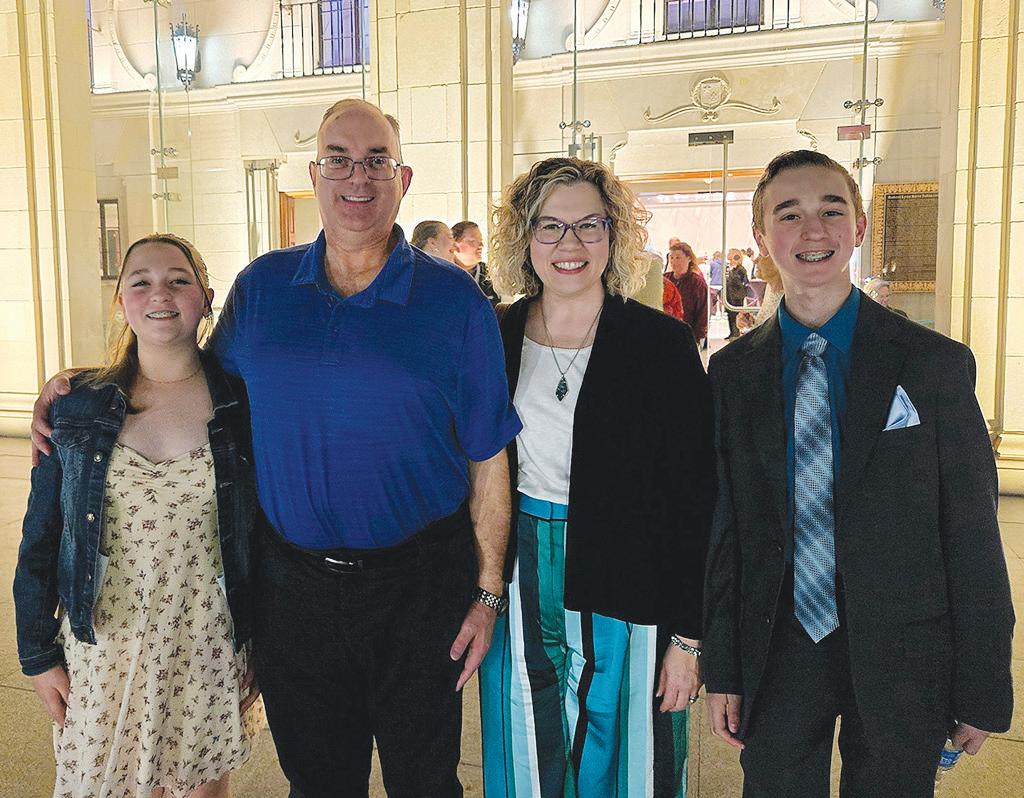
After completing college at the University of Mary HardinBaylor in Belton, Burleson began her teaching career at Academy High School in Little River, just down the road from the Central Texas college town. She taught theater arts and speech on an emergency certification. “I quickly realized that being a high school theater teacher is a lot like being a coach, and I struggled with finding balance in my life,” she said.
Burleson stopped teaching for five years until she returned to Harleton and took a job as the elementary school’s fine arts teacher. “This was much more my speed, and I was able to complete my alternative teacher certification while at Harleton. Three years later, I moved to San Antonio and began my career in Northside ISD as a fourth grade teacher.”
She’s been with Northside ever since, serving as a gifted/ talented specialist in middle and elementary schools for a decade before taking on her current role as the district’s GT testing coordinator, a position she’s had for the past three years. Along the way, she met her husband, Robert Burleson, a fellow GT teacher in Northside ISD with whom she has three children, and found her calling as an advocate for students and fellow teachers.
“I believe that every student deserves the opportunity to learn and grow. As an educator, my role is to foster that growth by creating a safe, inclusive and engaging learning environment where students can take risks, embrace challenges and learn from mistakes,” Burleson said. “I believe in helping students ‘fail forward,’ knowing that growth often comes through setbacks. While students may start and end at different points, my goal is to ensure they are always moving forward in their learning journey.”
No two days are quite the same in her current role, which Burleson says is what keeps the job interesting.
“On any given day, I might be working with district and campus staff to make GT placement decisions, troubleshooting technical issues for a campus, creating professional development, or helping a GT specialist problem-solve a unique student situation. The most rewarding part of my job is knowing that the work I do behind the scenes makes a real difference for students and the teachers who serve them,” Burleson said. “On the flip side, one of the most challenging parts is trying to meet the diverse needs of 120+ campuses — especially during our busy testing windows. It can be hard to make everyone feel supported when you’re pulled in so many directions, but I try to show up with a servant’s heart and do the best I can each day.”
Supporting students and staff keeps Burleson motivated.
“Even though I’m no longer in the classroom full-time, I still think of myself as a teacher first,” she said. “What motivates me is knowing that my work ultimately impacts
Vivian Burleson with her husband, Robert, and their two youngest children Reagan and Kinley.
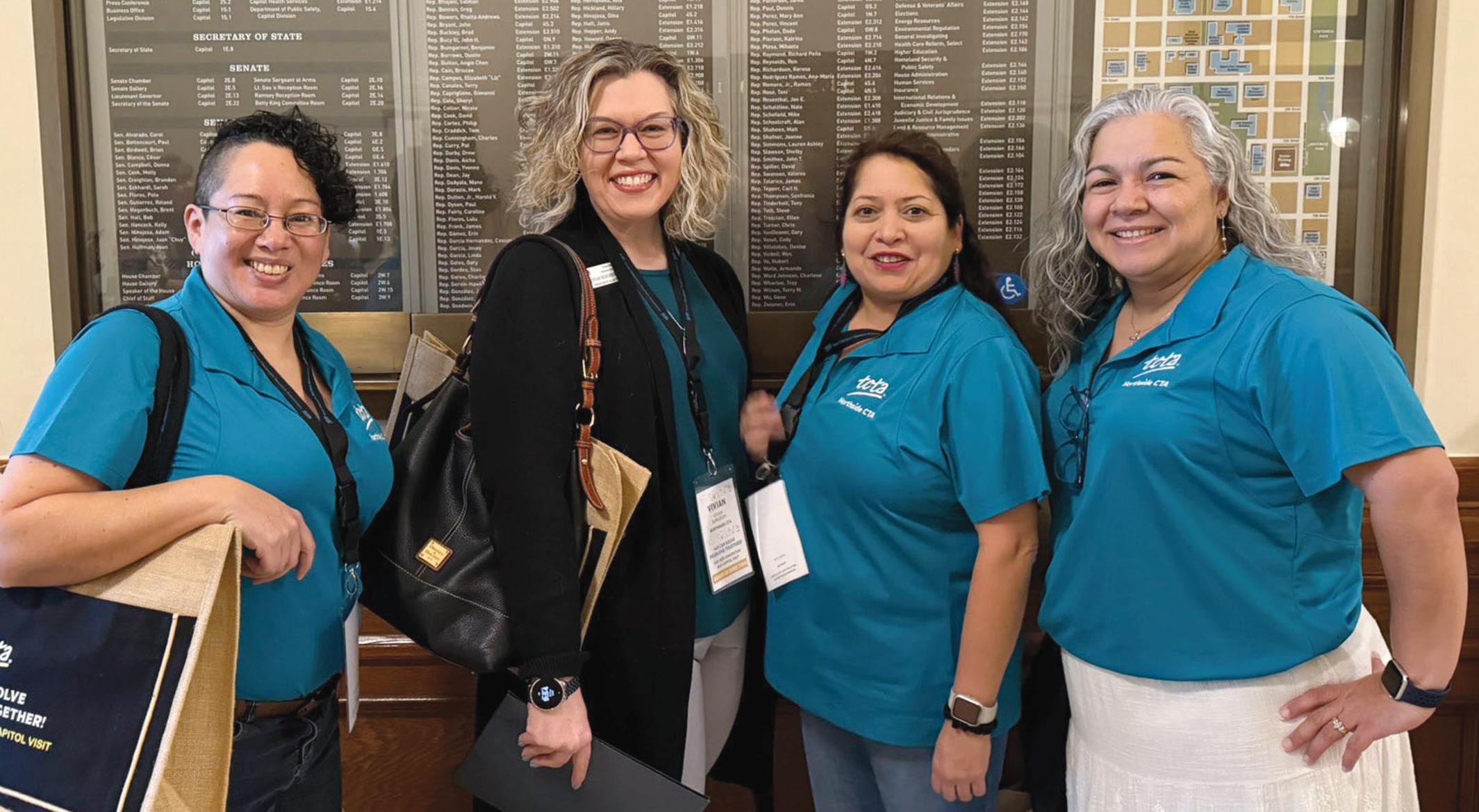
students, especially those who may not always have someone advocating for them. I also find energy in supporting our GT specialists, who are some of the most creative and passionate educators I know. Helping them do their best work means students across our district are getting what they need to thrive.”
In the coming year as TCTA’s 2025-26 state president, Burleson looks forward to being an advocate for educators across Texas, especially when she reflects on how teaching has evolved during her two-plus decades of service.
“On the positive side, we’ve made great strides in understanding how students learn and in embracing different learning styles and needs. There’s also been a shift toward social-emotional learning, which is so important in building whole, healthy learners,” she said. “(But) the profession has also become more demanding — especially with the increase in paperwork, challenging behaviors, extra duties, and teacher accountability measures without equitable compensation. Many educators feel stretched thin, and we’re losing too many great ones because of burnout. Still, I remain hopeful. Teachers are incredibly resilient, and I see so many of them continuing to innovate and care deeply in spite of the challenges.”
Funding and teacher retention top Burleson’s list of key issues facing public schools in Texas.
“When schools don’t receive adequate funding, it affects everything — class sizes, resources, staff salaries, and student support services. We are asking teachers to do more with less, and it’s simply not sustainable. Additionally, many experienced teachers are leaving the profession, and we’re not seeing
enough new ones entering to fill the gap,” she said. “TCTA helped teachers gain significant wins in this recent legislative session, but the state still hasn’t gone far enough to reverse the damage we have seen from years of inadequate funding. In the future, I hope we’ll see a stronger commitment to public education, including competitive pay, fully funded programs and respect for the profession. Our students deserve nothing less.”
That’s a message she plans to share at the Capitol as TCTA continues its work to improve conditions for educators and students.
“Through my years of state service, I’ve gotten to work with some amazing professionals from all over Texas and see that I am not alone. Although we are very diverse, we share common experiences — both positive and negative. We share many of the same victories and frustrations, and we share a vision of the future where Texas public education could do so much better for our students and teachers alike. I love being able to discuss ideas with others and work with TCTA staff to build a better tomorrow,” she said.
“I can’t wait to meet more teachers from across the state and hear their stories. One of my goals (as TCTA state president) is to help remind educators why they fell in love with teaching in the first place. Even in the current climate, there are still joyful, meaningful moments to be found. I want to encourage teachers to notice and savor those moments — whether it’s a breakthrough with a student, a good laugh in the staff lounge, or the quiet satisfaction of a lesson that
Continued on page 16
Vivian Burleson, second from left, and fellow Northside CTA members Linda Rodriguez, Patty Cantu and Lynnette Frausto met with legislators during TCTA’s Capitol Visit in January. Burleson also testified before lawmakers in 2023.
really landed. We give so much of ourselves to this profession, and while the challenges are real, so is the impact we make. Let’s celebrate the wins, however small, and keep lifting one another up.”
Burleson’s entire career has been dedicated to lifting others up. She shared her experience with a student in a third grade GT class who struggled with perfectionism and anxiety.
“For weeks, she wouldn’t finish projects because she was afraid they weren’t good enough,” Burleson recalled. “I worked with her on setting small goals and celebrating progress instead of perfection. By the end of the year, not only was she completing her work, but she confidently presented her research project on the 1990s at our GT showcase — something she never would have considered months earlier. Years later, I ran into her dad who told me that experience helped change the way his daughter viewed herself. It’s moments like that which remind me why this work matters.”
Life isn’t all work though. Burleson enjoys traveling when her budget allows as well as spending time with her family. Her husband, Robert, is a longtime Northside educator and
fellow TCTA member. Their oldest daughter, Madison, lives in North Carolina and is studying to be a special education teacher. Their son, Reagan, will be a high school junior this year and is working on getting his driver’s license, and their youngest daughter, Kinley, will be in eighth grade and is the social butterfly of the family.
“It’s a role I don’t take lightly, and I hope to represent our members with authenticity, compassion, and a commitment to truly hear and advocate for their needs,” she said. “If our members ever have ideas, feedback, or just want to connect — I encourage them to please reach out. We’re all in this together, and I truly believe that with collaboration and dedication, we can make a difference.” Continued from page 15
“We stay busy trying to coordinate everyone’s calendars,” Burleson said, which also includes time for family game nights. “My competitive side tends to come out when playing games — there’s no ‘letting the kids win’ in our house.”
A self-described introvert, Burleson loves connecting with others and says she enjoys public speaking when she’s passionate about a topic, but she balances that with quiet time to recharge.
Burleson is definitely passionate about TCTA and is grateful for the opportunity to serve as state president.

MAKE SURE ADA ACCOMMODATIONS ARE IN PLACE AS A NEW YEAR STARTS
Do you have workplace accommodations in place due to a disability? TCTA recommends that you check in with your district when going back to school to confirm that your accommodations remain in place and that the district’s records are accurate. Although workplace accommodations put in place pursuant to the Americans with Disabilities Act (ADA) do not “expire,” an employer may periodically review accommodations to ensure that they continue to remain effective based on your current medical condition. If there has been a change to your medical condition or your job duties, it may become necessary for you to recertify your accommodations or provide updated medical documentation.
In most districts, you can confirm your accommodation status by simply emailing your district’s human resources or employee relations department, as applicable. If your medical condition, limitations and job duties have not changed, simply let them know of that fact and that you are reaching out to confirm that your previous accommodations remain in place for the upcoming school year.
TCTA members who have questions about requesting workplace accommodations due to a disability can contact the TCTA Legal Department at 888-879-8282 for assistance.
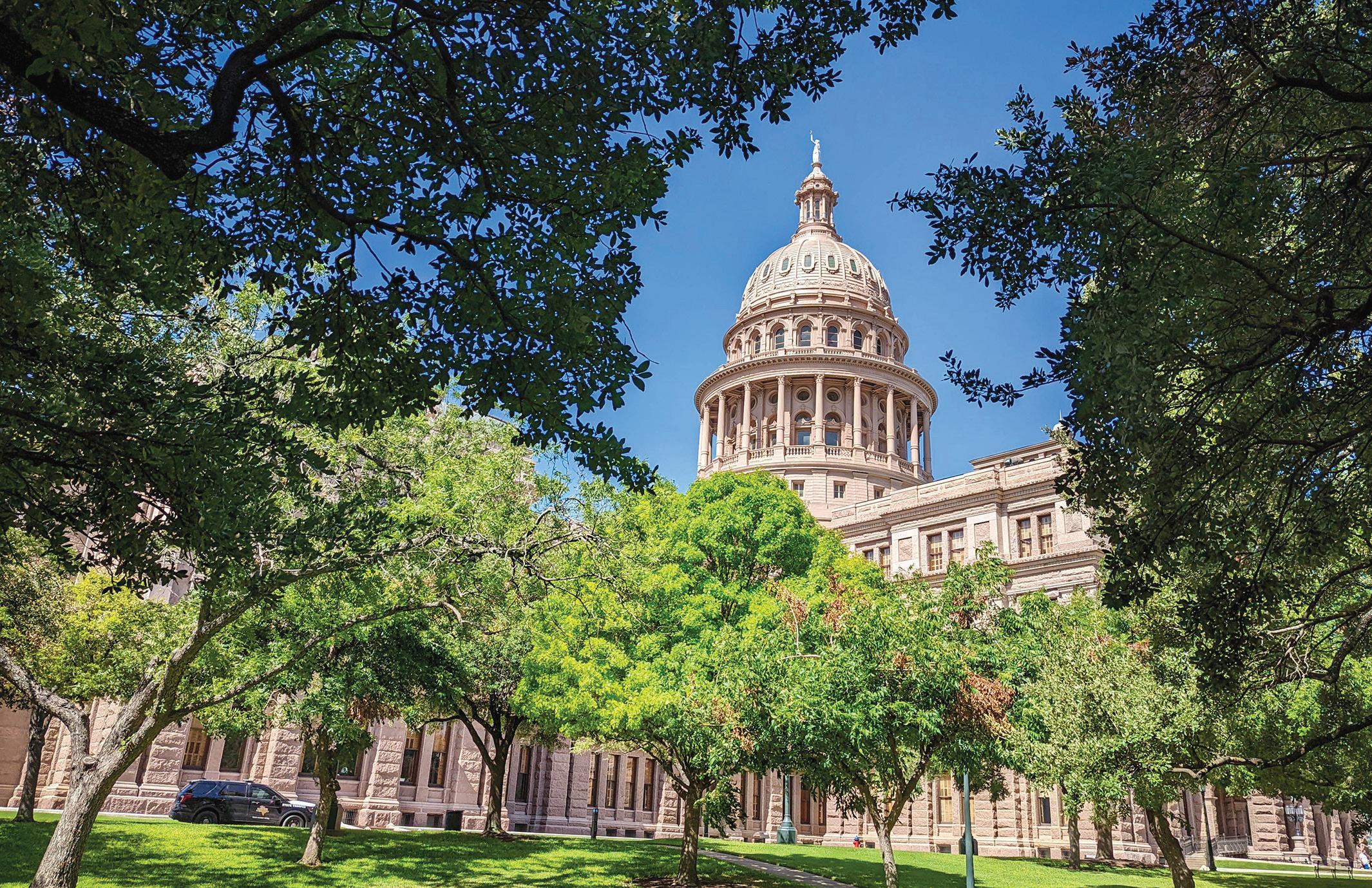
Regular Session Recap
HOUSE BILL 2 PROVIDES $8.5 BILLION IN FUNDING AS LAWMAKERS MAKE EDUCATION A PRIORITY IN 2025
Each legislative session comes with its ups and downs. In 2023, the regular session and subsequent special sessions were characterized by the dramatic defeat of school voucher legislation, which also stymied meaningful support for teachers, both financially and in the classroom.
In 2025, with funding and teacher shortage crises worsening across the state, advocates were optimistic that lawmakers would pass impactful bills to support public education. Indeed, education was a top priority of state leaders in 2025, but much of that focus was consumed by Gov. Greg Abbott and Lt. Gov. Dan Patrick’s desire for a statewide school voucher program.
At the beginning of the session, the Senate quickly passed Senate Bill 2, the school voucher bill, and sent it to the House where it remained for months without action. Meanwhile, the House offered House Bill 2, a comprehensive school finance bill packed with other education provisions, which similarly languished in the Senate. After negotiation between leaders
in both chambers, the bills were finalized and sent to the governor’s desk by the session’s end.
Both of those bills and other major education-related legislation were signed into law by Abbott, but a handful of promising bills died during the process, including a bill that would have scrapped STAAR testing and replaced it with a series of shorter tests throughout the school year.
Despite concessions to implement school vouchers, teachers secured a few significant wins during 2025 with direct salary increases, strengthened classroom discipline laws, positive changes to teacher certification, and more.
BIG BILLS
The biggest victory for teachers came via HB 2, which provided $8.5 billion in funding for public schools as appropriated in SB 1 (the budget bill). Roughly half of that is devoted to required pay raises and Teacher Incentive
Continued on page 18
OTHER BILLS OF INTEREST
• HB 1481 requires districts and charters to adopt a written policy prohibiting students from using a cellphone, tablet, smartwatch, or other personal communication device while on school property during the school day. The policy can prohibit students from bringing such a device onto school property or can provide for a method for the storage of the device while the student is on school property during the school day. It must include exceptions if needed for implementation of an IEP, by a student with a documented need as directed by a physician, or if needed to comply with a health or safety requirement.
• HB 500 provides additional funding to TRS ActiveCare to keep the costs of premium increases to no more than 10%. (TRS adopted premium rates averaging 9.7% statewide, but with regional variations, on June 3.)
• SB 10 requires public schools to display in a conspicuous place in each classroom a poster or framed copy of the Ten Commandment, if such posters are donated or the district chooses to purchase them. Includes specifications regarding the version, size, font style, and visibility of the poster.(Lawsuits have been filed challenging the constitutionality of SB 10.)
• SB 13 ensures the right of parents to access library catalogs and records of school library materials their child obtained through the library; clarifies existing prohibitions in school library collections regarding indecent or profane content, or material that includes a link to prohibited content; gives districts the option to create a local school library advisory council (mandatory upon a petition of at least 10% or 50 parents of enrolled students) which comprises parents, with optional teachers, librarians and others as nonvoting members; and provides a process for challenging library materials.
• SB 12 — a comprehensive bill regarding parents’ rights in their child’s education — includes a prohibition of practices related to diversity, equity and inclusion duties; a ban on assisting a person with social transitioning including the use of different pronouns or adoption of a different name in conflict with their biological sex at birth; and a prohibition of student clubs that are based on sexual orientation or gender identity. You can read more about these bills and others in TCTA’s session recap at tcta.org/capitol-updates/ final-bills-2025.
Continued from page 17
Allotment program enhancements (see below); districts will also receive $1.3 billion dedicated to basic ongoing costs (utilities, required TRS increases, etc.) designed to free up district funds for other purposes, $850 million for special education changes, $677 million for early learning and CTE and more.
Under HB 2, experienced classroom teachers (not counselors, librarians, nurses) will receive raises. In a district with more than 5,000 students, a teacher with 3 or 4 years of experience receives $2,500, and a teacher with 5+ years receives $5,000. In a district with 5,000 or fewer students, those amounts are $4,000 and $8,000, respectively. Teachers with less than 3 years of experience did not receive raises under HB 2. But, since these are intended as permanent raises with state funding, as a teacher gains years of experience, they will receive the higher amount. In most cases, these raises must be passed directly to the teacher. However, if a district is applying to be an “enhanced Teacher Incentive Allotment system,” it would receive the same per-teacher funding, but the raises must be based on performance.
Districts also will receive funding ($500 million statewide) to increase salaries for non-administrative employees, such as counselors, librarians, nurses, paraprofessionals, etc. Districts have authority over how to distribute these raises.
HB 2 also includes enhancements to the Teacher Incentive Allotment program. The amounts provided for TIA designations were increased and a new “acknowledged” designation was created. In other changes, National Board certification no longer qualifies a teacher for the “recognized” designation, but for a “nationally board certified teacher” designation with an accompanying allotment of $3,000 to $9,000 (the higher amounts are for high need and/or rural districts). However, the State Board for Educator Certification will undertake a review of the National Board certification program and determine no later than Dec. 31, 2026, whether to reauthorize or revoke this automatic designation.
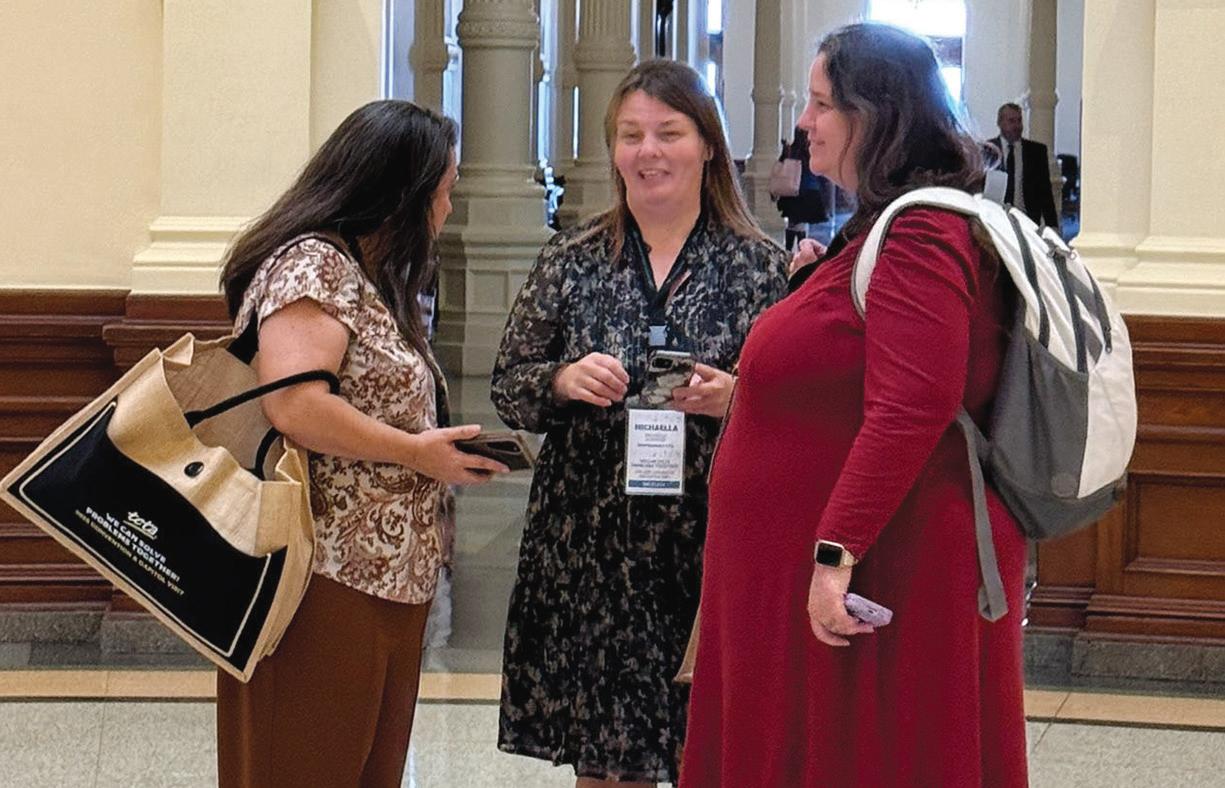
From left, Ashley Calderon, Michaella Eldredge and District 10 Councilmember Mocha Wohlgemuth of Whitesboro CTA visit the Capitol.
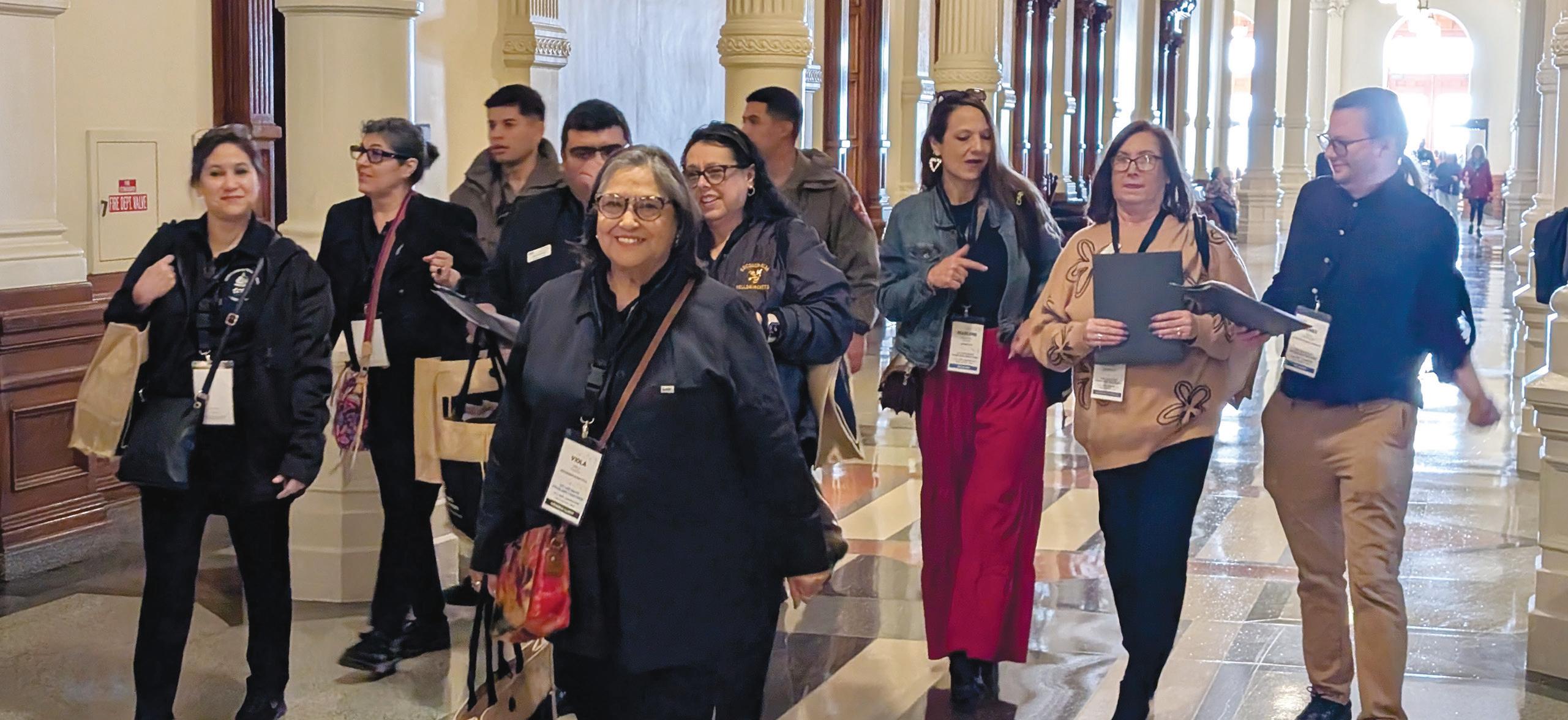
A new enhanced TIA program would entitle districts to 10% more TIA funding; those districts would need to meet additional criteria that include performance-based compensation for principals and assistant principals, and a prohibition on across-the-board raises for teachers (except for periodic adjustments for “significant inflation,” which is not defined in the bill).
HB 2 makes changes to literacy and math academies, including requiring teachers who provide math instruction in grades K-3 to attend a math academy no later than the 203031 school year.
HB 2 will prohibit districts of innovation from exempting themselves from parent notification requirements and certain teacher certification requirements, and prohibits any district from employing a teacher of record for a foundation curriculum course who does not hold an appropriate certificate or permit beginning in the 2026-27 school year. (There is a grace period allowed for implementation of this new prohibition for up to five years (up to the 2029-30 school year), subject to approval of the education commissioner.)
Also, DOIs with an applicable teacher certification exemption for the 2026-27 school year can employ — for that year only — a teacher without the appropriate certification for a course other than reading/language arts or math above grade 5. Districts can still apply for waivers and issue school district teaching permits as under current law. The bill also includes financial incentives for districts to help their uncertified teachers become certified.
HB 2 includes provisions relating to the costs to districts of hiring retirees. Under previous law, districts were not allowed to pass on TRS surcharges to the retiree, but the bill repeals that. (Read more on retire/rehire in Planning Ahead on page 8.)
HB 6 is another key education bill that gives districts more flexibility in how to address student discipline and requires more parental participation in disciplinary actions. It also gives
teachers more authority over disciplinary actions. (See more on HB 6 in Legal Notes on page 10.)
SPECIAL SESSION UNDERWAY
With most of the leadership’s education priorities resolved during the regular session, advocates predicted that there might not be any special sessions in 2025. But Abbott’s lastminute veto of SB 3, a bill that would have banned THC products in Texas that was Patrick’s No. 1 priority for the session, changed things. Rarely do the two top executives in the state disagree so publicly, but Abbott ended up calling a special session to address the THC issue, among other things.
His initial call did not include any education-related topics, but following the tragic July 4 floods in Central Texas, Abbott added several items related to severe weather preparedness to the special session agenda and took the opportunity to also include congressional redistricting and eliminating the STAAR test. With 18 items and a 30-day window starting July 21, some legislators have expressed doubt that they can adequately address each of those issues in a special session, which may portend additional special sessions for any unfinished business. TCTA will track the special session at tcta.org/capitol-updates and in the eUpdate newsletter.
It can be difficult to stay engaged with education policy between regular sessions, but contacting your state-level law makers throughout the legislative cycle and not just while they are in Austin can pay dividends when the next session begins. Keep track of how major bills from this session have affected your working conditions and let your representatives know if the latest solutions are working. TCTA will continue to advocate for you as state agencies work on rules to implement new legislation, and will let you know when we need teachers’ voices to provide firsthand accounts of the realities of teaching in Texas.
TCTA members visit the Capitol in January to talk with lawmakers about education issues as the session gets underway.
Continued from page 19
LEGISLATIVE RECOGNITION
It becomes harder every session to find legislative standouts committed to helping teachers and public schools — especially those who are successful at passing good laws or opposing bad ones.
There is a core group of legislators who consistently support teachers, and we appreciate them immensely. The list below reflects individuals who also took action, often working directly with the TCTA lobby team on issues important to educators, sometimes in opposition to party leaders. In several cases, we disagree with the lawmakers on other issues, but were able to find common ground and work productively with them.
SENATE
Sen. Charles Perry (R-Lubbock)
Without any meaningful progress on school discipline in 2023, Perry and his staff were eager to continue working with TCTA this session to craft legislation to address the issue. In the Senate, he sponsored HB 6, a major school discipline bill, and worked closely with Rep. Jeff Leach, the bill’s author, to ensure it made it over the finish line. TCTA worked with Perry and his staff to fine-tune HB 6, and we appreciate his continued advocacy for keeping classrooms safe for students and teachers alike.
Sen. Carol Alvarado (D-Houston)
The chair of the Senate Democratic Caucus, Alvarado and her staff were helpful in working with TCTA on proposed amendments to improve major legislation on school vouchers, school employee salaries and public school funding. She is consistently willing to ask tough questions on the Senate floor to illuminate potential problems in education bills. This session, Alvarado co-authored legislation that doubled the school safety allotment created during the last legislative session in response to the tragic May 2022 shooting at Robb Elementary School in Uvalde.
Sen. Robert Nichols (R-Jacksonville)
Nichols is a longtime supporter of public education and made school safety his priority during the last two sessions. He supported a TCTA-initiated provision to permit school safety funds to be used for behavioral interventionists to assist teachers with classroom discipline.
After 18 years in the Senate, Nichols will retire and has not stated whether he will run for any other office. He is the only current Republican senator to oppose using taxpayer funding for private schools and measures that would erode the ability of TCTA and other pro-public education groups to advocate for teachers and other school employees. He understands
STAFF SHOUTOUTS
Legislators rely heavily on their staff members — and so do we. They seek our feedback on policy issues, we come to them for help with issues, and some of them let us sit for a while in their offices just to charge our phones and exchange the latest political gossip.
We don’t have space to thank everyone who helped throughout the session, but here are a few standouts:
• Court Manske and Steven Santoyo, Senate K-16 Committee
• Rob Callan, Sen. Charles Perry’s office
the importance of lobby groups such as TCTA to represent the interests of teachers in the legislature, and his presence at the Capitol will be missed.
Sen. José Menéndez (D-San Antonio)
and Sen. Royce West (D-Dallas) Menéndez and West are the only two Democrats on the 11-member Senate K-16 Education Committee. Though outnumbered on partisan issues, they are consistently supportive voices for public education and do not hesitate to ask tough questions during committee hearings or on the Senate floor. Both senators have a long history of filing pro-education and pro-teacher bills each legislative session. They reach out to TCTA frequently for feedback on issues coming before the committee. They are smart and knowledgeable, in touch with what’s going on in public schools, and we appreciate their unwavering support for teachers each session.
HOUSE
Rep. James Talarico (D-Austin)
A former teacher in San Antonio, Talarico has always prioritized public education during his time in the Texas House. Much of his energy this session was spent speaking out against private school vouchers and advocating for significantly increased teacher salaries and classroom supports, but he and his staff always made time to hear TCTA suggestions on key legislation (and he graciously agreed to speak to TCTA delegates at our annual convention). His significant social media presence, highlighting well-thought-out, factual arguments, often brought national attention to education issues on the table in Texas. Talarico has hinted that he may consider running for higher office in the upcoming election cycle.
Rep. Diego Bernal (D-San Antonio)
Bernal returned to the House Public Education
• Sushma Smith, Sen. Carol Alvarado’s office
• Shelby Vestal, Sen. Robert Nichols’s office
• Pearl Cruz and Hutch Hutchinson, Sen. José Menéndez’s office
• Vanessa Tanner, Rep. Brad Buckley’s office
• Jack Reed, committee clerk, House Public Education Committee
• Georgeanne Palmer, Rep. Keith Bell’s office
• Joseph Seeber, Rep. Trent Ashby’s office
• Zack Cochran and Sydney Ramon, Rep. Diego Bernal’s office
• Lauren Young, Rep. Jeff Leach’s office
• The staff of Rep. James Talarico
Committee as its vice chair this session after having not been appointed to the committee in 2023. He wisely used his powers as vice chair to invite witnesses to speak against private school vouchers and to ensure that pro-teacher bills received public hearings. He and Chairman Brad Buckley (R-Salado) worked together to boost funding for public education and to increase teacher salaries across the state, and their frequent bipartisan efforts effectively refined much of the legislation that came out the committee. Bernal’s office also worked closely with the TCTA staff to ensure that the teacher perspective was included.
Rep. John Bryant (D-Dallas)
Bryant had a stint in the Texas House for nine years beginning in the 1970s, before moving to Congress for several terms. He decided to return when he felt that his many years of experience at the state and federal levels could bolster Democratic party leadership in the Texas House. That confidence was on display this session as he never hesitated to speak up in House Public Education Committee meetings when potentially harmful proposals were discussed. Though doomed from the start, his HB 1267 would have raised the basic allotment by nearly $3,000 per student and greatly enhanced educator salaries.
Rep. Trent Ashby (R-Lufkin)
Ashby made a return appearance to the House Public Education Committee this session and left an impression right away as an attentive listener and thoughtful questioner. He also chaired the Subcommittee on Academic and Career-Oriented Education through which a handful of more specialized bills flowed. Ashby and his staff welcomed TCTA suggestions on many bills and often worked with us on potential amendments. With Sen. Nichols’ retirement, Ashby has announced that he will run for that vacant Senate seat in the 2026 election cycle.
PLANNING AHEAD
Continued from page 9
the service retiree’s employment with a TRS-covered employer does not qualify for an EAR exception. Instead, service retirees are subject to a “three strikes” warning procedure before forfeiting their annuity payments. This means if you exceed the EAR limits, you will first be notified of an EAR violation without loss of annuity. You will receive a warning or “first strike.”
If you exceed the EAR limits again, after TRS issues your first strike warning, you will receive a second warning and be required to pay TRS what you earned for the month that you exceeded the EAR limits or the gross amount of your annuity payment for that month, whichever is less. This second warning and partial repayment requirement is your “second strike.”
If you exceed the EAR limits again, after receiving your second strike, that is your “third strike” and you will forfeit your full monthly annuity for each month that you exceeded the limits. Each EAR notification will include the months the violations occurred as well as the amount owed for each strike, if applicable. Please keep in mind you will only receive
a first and second strike once in your retirement. Your strikes do not reset each school year.
What are some other considerations for returning to a TRS-covered employer after retirement?
A flat TRS-Care surcharge on districts for hiring a retiree is generally required for retirees returning to work with a TRS-covered employer if they retired after Sept. 1, 2005, and exceed certain work limits. For instance, working more than 92 hours in a calendar-month or more than 11 days (combining substitute and other work) triggers the surcharge. School districts are also responsible for employer contributions to TRS, which historically were around 16.5% of the retiree’s salary, depending on the school year.
The law previously prevented employers from passing on TRS surcharges to rehired retirees, but that provision was repealed in House Bill 2 of the 89th regular legislative session. Beginning with the 2025-26 school year, districts and colleges may require rehired retirees to assume the cost of TRS surcharges. House Bill 2 also makes state
Make the most of your membership!
Take advantage of TCTA’s cost-saving programs as you plan your next adventure. Log in at tcta.org/ membership/discount-programs to find deals on Schlitterbahn, Six Flags and other amusement parks, movie tickets, professional sports tickets, zoos, museums, concerts, Broadway shows and more.
Save on car rentals with Alamo, Avis and Budget. Reserve hotel rooms with participating Choice Hotels or Wyndham Hotels & Resorts, which include La Quinta properties. TicketsatWork also offers packages for cruises along with thousands of shopping deals. Explore all the savings today!
funds available to districts if they choose to use them to assist with the cost of surcharges.
Finally, a district participating in TRSActiveCare may be required to offer ActiveCare enrollment to a returning retiree, but the retiree may opt to remain in TRS-Care.
You may explore the TRS Interactive Employment After Retirement video, along with other videos in the TRS member education video series at https://www.trs.texas. gov/learning-resources/videos/ pension-education-resources.
The video answers the most common questions about returning to work after retirement as well as rules and restrictions that may apply.
Ultimately, the decision to return to teaching after retirement is a personal one. By carefully weighing the potential benefits and challenges, you can determine if this path aligns with your personal and financial goals for a fulfilling and impactful retirement.
As you weigh your options, TCTA strongly advises retirees to consult with a benefits counselor at TRS by calling 800-223-8778 to discuss your personal situation.

EXECUTIVE DIRECTOR’S MESSAGE
Continued from page 2
daughter, a student at the campus, had lost her life, and encouraged other members of the school family to visit a makeshift memorial at the campus. Community members in California’s Bay Area gathered at an elementary campus to pray for a local family missing in the Texas floods.
In times of crisis, nearly everywhere you look, there are connections to our schools. As the Leander foundation director said, “Education is more than showing up in the classroom, and books and curriculum.”
Even in the direct aftermath of the floods, the days of the
Continued from page 7
to shift, delay, impound or rescind funds appropriated by Congress.
During FY 2025, agencies have been directed to impound (withhold) federal funding for programs that have been approved through appropriations. Notices of funding opportunities have been paused, and in many instances, entities have been notified that grant funding has been canceled.
Most recently, the Education Department notified state education agencies it would freeze more than $6 billion in K-12 formula grant funding to local school districts for programs including migrant education, beforeand after-school programs, services for English language learners, and adult education. These programs were also proposed for elimination in the administration’s FY 2026 budget request. By the end of July, it was announced that the White House OMB had agreed to reverse course and unfreeze most of the K-12 funds, after a group of senators asked that states be allowed to determine the use of funds.
In delaying funds to agencies, OMB can target those funds for a formal rescission. A rescission is a legislative proposal made by the president designed to cancel previously approved, but not yet obligated, discretionary funding for federal programs. A rescission must be approved by Congress, acknowledging its budget authority over federal agencies.
In mid-July Congress approved a rescission request that would cut funds
summer calendar are being ticked off and preparations for the beginning of a new school year are underway. Schedules must still be perfected, bus routes developed, classrooms equipped and decorated. And in those routines, there is a certain restoration of order and familiarity for the community as cleanup from the devastation continues.
If there’s a lesson here, it’s not just about disaster preparedness or emergency response. It’s about recognizing the full scope of what public education contributes to society. When the waters recede and news cameras leave, schools will still be there — repairing damage, reopening classrooms, and restoring normalcy for students, their families and their communities.
from foreign aid programs and public service radio stations. OMB Director Russ Vought indicated additional rescission packages would be sent to Congress targeting other agencies, although their passage could be more difficult. Rescission packages require a simple majority, but with rising tensions between and within parties, legislating becomes increasingly challenging.
The referee between the Trump administration and Congress over the illegal impoundment of funds is the Government Accountability Office. The GAO has already ruled in three cases of illegal impoundment where the Trump administration is refusing to disburse funds it is required by law to spend and at least 35 more cases are pending. GAO has enforcement authority and can sue the Trump administration in federal court, if needed, to get impounded funds released.
School Choice
The One Big, Beautiful Bill Act (H.R.1), the tax and spending package passed by Congress and signed by President Trump on July 4, includes a Republican-led national school choice provision that could increase competition with public schools. The provision allows individuals or corporations to make donations to nonprofits that offer educational scholarships to students and families seeking an alternative to their local public schools.
Scholarships can cover qualified expenses such as tuition, fees, tutoring and supplies for students at private,
religious or charter schools. It can also cover transportation, room and board, and computer equipment. Families can receive a nonrefundable credit of up to $1,700 per student, which is to be used exclusively for the student’s education expenses. To qualify, students must be eligible to enroll in public K-12 schools and reside in households earning 300% or less of the local median income.
A Senate-added provision includes an opt-in determination for states, such that governors can reject the tax credit offering altogether or, if approved, they may designate eligibility of scholarship groups. This provision lessens the force behind expanding school choice offerings, as individual states may decline to participate. A provision to restrict the overall cost to the federal government, set at $5 billion, was ultimately dropped.
The Treasury Department will issue rules and regulations regarding the implementation of the tax credit program and will identify any caveats that impact nonprofit and religious organizations receiving the funds. It is noted that this school choice program does not divert public education funds, a main argument from opponents of the movement. However, opponents warn about the furthering of a two-tier K-12 education system in America, a private school track for the well-connected, and a public-school track for those with fewer resources.
This article is provided by Van Scoyoc Associates, TCTA’s retained lobby firm in Washington, D.C.
WASHINGTON WATCH

Texas Classroom Teachers Association
PO Box 1489
Austin, TX 78767-1489
888-879-8282 | tcta.org
Return Service Requested





